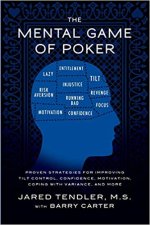
Learning from "Mastering the Mental Game of Poker" provides several examples and practical exercises throughout the book to help readers understand and apply the concepts discussed. Here are a couple examples of exercises that the book suggests:
One try that the book suggests for managing emotions at the poker table is to practice deep breathing and visualization techniques. For example, the book advises players to take a deep breath, hold it for a count of four, and then exhale slowly for a count of four. This exercise can be repeated several times to help reduce anxiety and promote a sense of calm and focus.
Another exercise that the book suggests for preventing and managing tilt is to remind your self of your long-term targets. as example, the book advises players to write down their goals, such as "I want to become a winning player over the next six months" and refer back to them when they feel tilted. This can help remind them of the bigger picture and regain their focus on the fundamentals of the game.
The book also provides a example for the importance of having a winning attitude. It cites the case of player "X" who is a talented player but not consistent, and is always looking for excuse in his bad luck, opponent's cheating and so on, instead of focusing on his own game. Through this case, it shows how the player's attitude is affecting his game and performance, and how changing the attitude can improve the performance.
These are just a few examples of the many exercises and examples that "Mastering the Mental Game of Poker" provides to help players improve their mental game and performance at the poker table.
One pages in the book focuses on developing a strategic mindset. It explains how to think critically and make better decisions at the poker table. For example, the book advises players to consider the range of hands their opponents may have and to think about what information they are giving away with their actions. To develop this skill, the book suggests to take some time after each session to review and analyze hands and decisions, to check opportunities for improvement.
Another important chapter is the one that focuses on building and maintaining confidence and trust . Confidence can be vital at the poker table and the book suggests various ways to build it. For example, one way is to focus on past successes and to remind oneself of the times when they've played well and won. Another one is to set realistic and achievable goals and track progress towards them.
The book also covers the topic of "Handling Pressure", explaining that poker players need to learn how to play well under pressure. One of the ways to handle pressure is by preparing for it mentally, such as mentally rehearsing different scenarios that might arise and thinking through how to handle them. The book suggests to practice dealing with pressure in a non-poker setting, such as public speaking or interview, to help develop the mental toughness.
These are just a few examples of the many concepts and exercises that "Mastering the Mental Game of Poker" covers to help players improve their mental game. The book covers a wide range of topics related to the mental aspects of poker and provides concrete strategies for maximizing one's potential as a player.
Many of the concepts and strategies discussed in the book can be applied to other areas, such as investing in the stock market.
As example, the book's emphasis on managing emotions and avoiding tilt can be useful for investors who want to stay calm and rational when making investment decisions. The stock market is known to be volatile, and investors may experience strong emotions when the market rises and falls. By applying the techniques for managing emotions discussed in the book, investors can avoid making impulsive decisions based on fear or greed confusions .
Focus on developing a strategic mindset and building confidence can also be beneficial for investors. Just like in poker, investors need to be able to think critically and make well-informed decisions. Building confidence in one's able to make these decisions can help investors to stick to their investment strategy, even in times of market volatility.
Finally, the book's emphasis on setting realistic goals and keeping a long-term perspective can be useful for investors who want to achieve their financial goals. As in poker, investing is a long-term game and it's important to have a clear understanding of what one's goals are and how to achieve them, while being realistic about the expected returns and the time-frame.
Overall, while "Mastering the Mental Game of Poker" is primarily focused on poker, the concepts and strategies discussed in the book can be applied to other areas, such as stock market investing. For better tter decisions, manage emotions, and reach their goals.

